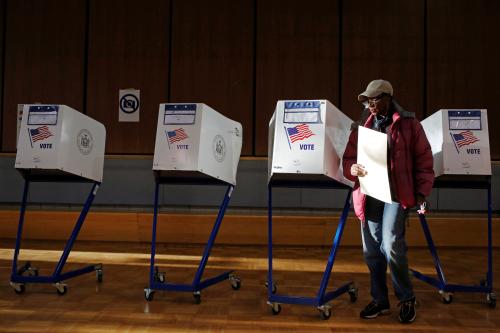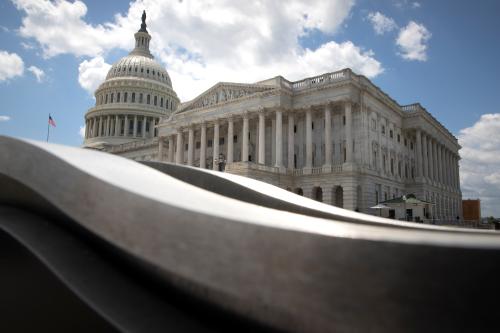That Donald Trump, aided and abetted by Republican lawmakers in Congress and the states, would launch the greatest assault on our Constitution since the Civil War was shocking but not surprising. The GOP long ago abandoned its commitment to democratic norms like forbearance—the notion that those in power should act with restraint.
The list of Republican dirty tricks is lengthy. Take, for instance, the longstanding norm of American politics that the outgoing party accept the transfer of power that comes with losing an election. Although there was no constitutional barrier to prevent Wisconsin’s outgoing Republican governor Scott Walker, in consort with the state’s Republican-controlled legislature, from stripping the governor’s office of power before the incoming Democratic governor could take office in 2019, they did it. North Carolina’s Republicans pulled the same stunt when the state’s voters elected a Democratic governor in 2016.
The 1965 Voting Rights Act was designed to ensure that every citizen had the right to vote and end the voter suppression that had long darkened America’s elections. It worked until Republicans began devising schemes to keep minorities from voting. In 2017, North Dakota Republicans enacted a law that requires voters to have written proof of a residential address before they are eligible to vote. The law targeted Native Americans who live on rural tribal roads that don’t have street names and numbers. Why did Republicans do it? North Dakota’s Native Americans vote heavily Democratic and the state’s upcoming 2018 U.S. Senate race appeared to be a tossup.
The idea of disenfranchising Democratic-leaning groups was first hatched by the Republican-controlled legislatures of Indiana and Georgia. In the early 2000s, they enacted laws requiring residents to have a government-issued photo ID, such as a driver’s license or passport, in order to register to vote. Minority group members, young adults, and people of low income—all of whom tend to vote Democratic—are less likely than white Americans to have a passport or driver’s license.
Nearly thirty states have since enacted voter ID laws and all but one did so when controlled by Republican lawmakers—thousands in all—who have claimed without evidence that the laws are needed to prevent voter fraud. The true purpose is unmistakable. As a longtime Republican political consultant said: “Of course it’s political. Why else would you do it?” Republican lawmakers in Florida and Pennsylvania slipped up and publicly said that the aim was to suppress the Democratic vote.
Although conservatives traditionally cast themselves as guardians of governing traditions and institutions, today’s Republicans pride themselves on finding ways to subvert them. The transgressions include Senate Republicans’ refusal to hold hearings on a Supreme Court nominee, President Trump’s claim of unlimited executive privilege, the weaponization of the Justice Department, and congressional Republicans’ refusal to pass laws to protect our elections from foreign interference. Gerrymandering also belongs on the list. Although an age-old practice, Republicans have taken it to appalling levels. In Wisconsin’s 2018 election, Republican candidates received only 45 percent of the popular vote but won 63 percent of the State Assembly’ seats.
These hijinks have been endorsed by the Supreme Court’s Republican-appointed majority. They have upheld voter ID laws, allowed unrestricted gerrymandering, stripped the Voting Rights Act of its oversight requirement, upheld the wholesale purging of voter registration rolls, and even let stand the North Dakota law that disenfranchises Native Americans without a formal street address.
The problem with voter suppression is that it lengthens the memory of those who are targeted. The votes of black Americans are now all but lost to the GOP. Asian Americans, who not that long ago sided with the Republican Party, now vote two-to one Democratic, as do Hispanics. Muslim Americans are five times more likely to vote Democratic than Republican.
Biden’s win was a victory powered by an unprecedented effort to turn out the groups that the GOP has sought to disenfranchise. If Senate Democrats were to abolish the filibuster, their opportunities for retribution would multiply. It would, for example, enable them to turn the federal judiciary on its head. Exercising the power of Congress to establish the size of the lower federal courts, Democrats could expand the number of federal judgeships and fill the seats with nominees of their party. And they would have cause for doing it. More than half of all filibusters of presidential nominees in the nation’s history were waged by Republicans during Barack Obama’s presidency to keep him from filling vacancies on the federal bench.
Democrats could even carry out their threat to enlarge the Supreme Court as payback for the seat that Republicans stole during the last year of the Obama presidency. If Democrats had not lost that seat, several recent Supreme Court rulings—including its 2019 gerrymandering decision—would have gone the other way.
Although the result would be a further deterioration of our governing norms, Democrats might have to take actions to protect our democracy from what Republicans plan to do next. With “widespread fraud” in the November election as a smokescreen, they’ve promised to curb mail-in voting and take other steps to limit ballot access. And they’re positioned to do it. They’re out of power in Washington, but the states determine most of the rules governing registration and voting. Republicans control half of the state governments and share control in half of the rest. Sadly, the lesson that Republicans took from their November defeat was that they hadn’t gone far enough in their efforts to suppress the vote.
The Brookings Institution is committed to quality, independence, and impact.
We are supported by a diverse array of funders. In line with our values and policies, each Brookings publication represents the sole views of its author(s).







Commentary
Trump is gone but Republican tricks will live on
January 25, 2021